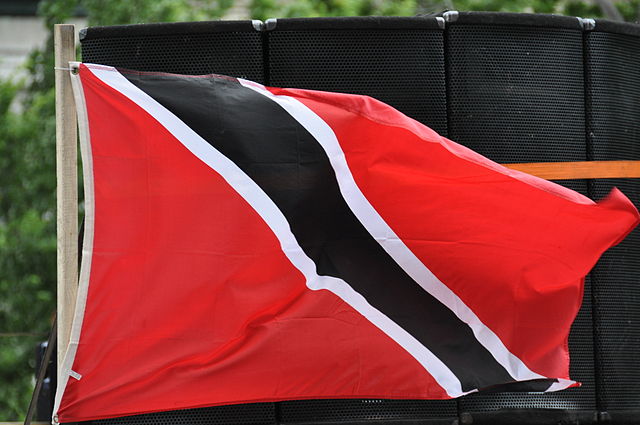Sabira Cole Film Festival celebrates Trinidadian independence with movie screening
Image via abdallahh, Wikimedia Commons
The flag of Trinidad and Tobago. The Sabira Cole Film Festival hosted a Trinidad and Tobago Independence Day Celebration on Tuesday to commemorate the nation’s independence from British rule.
September 1, 2021
While Pittsburgh may be a long way away from the cool breezes and sandy beaches of the tropical Caribbean islands, attendees saw and heard Caribbean culture at the Trinidad and Tobago Independence Day Celebration Tuesday evening.
Hosted by the Sabira Cole Film Festival, who partnered with JouvayFest, the celebratory event showcased Caribbean food, film and discussion right in Central Northside at the City of Asylum. The occasion marked the anniversary of Trinidad and Tobago’s independence from British colonial rule in 1962.
Kicked off by the lively beat of steel pan drums, traditional Trinidadian food accompanied the event. The atmosphere of the venue provided a backdrop for the focal point of the evening — the screening of the film “Glamour Boyz.”
“Glamour Boyz,” a sequel to the acclaimed film “Calypso Dreams,” is a documentary which follows two prominent Trinidadian calypso musicians. The film depicts the relationship between The Mighty Sparrow and Lord Superior, and the culture surrounding Trinidad’s music during the late 1950s to early 1960s.
Geoffrey Dunn, the writer, director and producer of the film, noted the importance of calypso music during Trinidad’s fight for independence.
“They were performing right through the time of Trinidadian Independence,” he said. “So the music provided an interesting link to that moment of independence and the end of British colonialism.”
Calypso is a type of traditional Trinidadian folk music, which served as a musical form of social commentary and political protest during the struggle for national sovereignty. It utilized various lyrical techniques such as wit and satire to critique the political establishment during the colonial era.
The film itself depicted the musical relationship of The Mighty Sparrow and Lord Superior as well as the role of calypso music in the era’s national political unrest. The footage highlighted the joy calypso music gave to the Trinidadian people despite the dark period in the country’s history.
The film featured interviews of the two musicians, live calypso performances and stunning reels of “found footage” from the height of calypso and culture’s intersection.
Ogechi Chieke, executive director of the Sabira Cole Film Festival, said film as a medium is an important tool in cultural activism now more than ever.
“It’s a conversation starter. It’s a point of entry,” Chieke said. “Film is the medium of our time. It definitely is a tool of activism if you want to inspire people, if you want to educate people.”
Chieke also said showing films like “Glamour Boyz” to a broader audience — who might be unfamiliar with Trinidadian culture — helps bridge the gap between cultural groups and local communities.
“It promotes cultural understanding,” Chieke said. “By learning about others we can learn about ourselves and we can see things that we have in common across cultures.”
Olivia Glacken, a junior biological sciences major, watched the online stream of the film. She said she was excited to be exposed to a culture she’s never interacted with before.
“As an outsider to that community I felt really brought in,” Glacken said. “It was a really cool experience, [and] got me a little out of my comfort zone to learn something new.”
Regarding the relationship between community activism and film, Dunn said one of the most important parts of film and storytelling is the ripple effects from telling just one story.
“There’s so many stories to tell,” Dunn said. “It’s like a pebble in a lake, and the films just have lives of their own and they keep telling the story.”
Dunn said the event highlighted his pride about how Caribbean and American culture come together. He said it’s a reminder that they both are celebrated by people from all over the world from varying backgrounds.
“It’s just a way of celebrating for me,” said Dunn. “The complexities of American culture broadstoke, and in the more narrow sense Caribbean American culture, in our country, and to not forget that we have these important Caribbean figures.”



